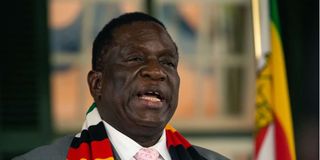EU renews Zimbabwe sanctions citing deepening crisis

Zimbabwe President Emmerson Mnangagwa during a press briefing in Harare on March 17, 2020.
The European Union (EU) on Friday renewed its targeted sanctions against Zimbabwe citing President Emmerson Mnangagwa’s reluctance to reform and worsening human rights violations.
Zimbabwe has been under an EU arms embargo and travel restrictions for some top government officials since 2002.
EU’s decision came less than a month after the United Kingdom slapped travel bans and asset freezes on three of Zimbabwe’s security chiefs and the country’s ambassador to Tanzania Anselem Sanyatwe over rights violations.
The block said it was concerned that Zimbabwe’s multifaceted and prolonged crisis had further deepened.
President Mnangagwa’s government has been accused of using the Covid-19 to clamp down on critics with frequent arrests and abductions of opposition activists.
“The lack of substantial reforms has allowed the continued deterioration of the humanitarian, economic and social situation,” the European Council of the EU said in a statement.
“Violations of human rights and limitations on the democratic space are also persisting.
“The EU is especially concerned about a proliferation of arrests and prosecutions of journalists, opposition actors and individuals expressing dissenting views, and the use by high-level officials of speech that could be interpreted as incitement to violence.”
President Mnangagwa’s government was also accused of failing to prosecute members of the security forces that shot to death six protestors in August 2018.
A commission of inquiry led by former South African president Kgalema Motlanthe recommended the prosecution of soldiers that shot the opposition supporters that were protesting against the delayed announcement of presidential election results.
“The government of Zimbabwe has committed to adhere fully to its constitutional and international human rights obligations which imply respecting human rights and fundamental freedoms, including addressing impunity,” the EU added.
“Perpetrators of human rights violations and abuses should swiftly be brought to justice and the recommendations of the Motlanthe Commission of Inquiry should be implemented as a matter of priority and urgency.
“In light of its continuing concerns, the EU has reviewed its restrictive measures, recalling their purpose to encourage a demonstrable, genuine and long-term commitment by the Zimbabwean authorities to respect and uphold human rights and the rule of law.”
Under the embargo, assets of the Zimbabwe Defence Industries would remain frozen.
The EU said the decision was made after taking into “account the situation in Zimbabwe, including the continuing need to investigate the role of security force actors in human rights abuses.”
“The restrictive measures against three individuals continue to be suspended. The EU will continue to closely follow developments, with a particular attention to the human rights situation, and recalls its readiness to review and adapt the whole range of its policies accordingly,” it said.
“These measures do not affect the people of Zimbabwe, its economy, foreign direct investment, or trade, and Zimbabwe continues to benefit from duty free and quota free access of its exports to the EU, with negotiations to deepen the Eastern and Southern Africa (ESA) Economic Partnership Agreement (EPA) on-going.
“Accelerated political and economic reforms, respect for human rights, boosting trust in the rule of law and tackling corruption would contribute significantly to investor confidence, build a steady business climate and facilitate Zimbabwe in taking full advantage of the opportunities the EPA provides.”
The EU says it regards electoral reforms as one of the pre-requisites to return to Zimbabwe into a democracy.
President Mnangagwa, who took over from long time ruler Robert Mugabe following a military coup in 2017, had set the restoration of normal relations with the West as one of his main priorities.
He, however, has been accused reneging on his promises of swift reforms and increasingly becoming despotic.
Other Western countries that have maintained sanctions on Zimbabwe are the United States, Australia, Canada and New Zealand.





